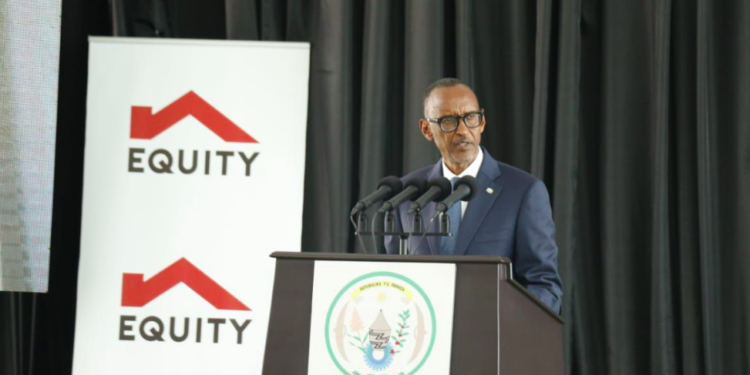Rwanda’s President Paul Kagame on Wednesday presided over the launch of Equity Bank’s Africa Recovery and Resilience plan and ground-breaking of one of the key transformational projects of the Plan. In Rwanda, flagship projects have already been delivered in the hospitality and financial services sectors. Other flagship projects that Equity has supported include mining, infrastructure development, agro-processing, regional trade, among others.
President Kagame lauded Equity Group for supporting investments in Rwanda through financial intermediation by Equity Bank. He expressed the Government’s appreciation to all investors in Rwanda and gave them the assurance of the Government’s continued support by creating a conducive environment for investment and business.
The Kigali Financial Square, under the Rwanda Finance Limited Corporation seeks to position Rwanda as the preferred financial hub for investments into Africa and will play a key role in supporting the aspirations of the Africa Continental Free Trade Area (AfCFTA). The initiative, which meets world class infrastructure standards in being LEED certified, is aligned to the national priorities of the Government by developing the financial ecosystem supported by, among other factors, fit for purpose technology.
Speaking during the launch, Dr. James Mwangi, Equity Group Managing Director, and CEO said; “As the Eastern and Central Africa region recovers from the devastating health, social, humanitarian, and economic impacts of COVID-19, Equity Group is championing a private sector focused stimulus package to accelerate recovery and resilience in the region. The Plan targets financing of in-country manufacturing and regional supply chains to replace broken global supply chains following COVID-19 disruptions and the impact of the Russia/Ukraine war. This will build regional strength and capacity against future shocks while contributing to economic recovery and growth and in creating employment opportunities for young people and markets for local producers.
Clare Akamanzi, the Executive Director, and CEO of the Rwanda Development Board said, “Given that Rwanda envisions being an upper middle-income country by 2035 and a high-income nation by 2050, it requires taking bold steps to achieve this ambitious target. One such target is to diversify the financial sector and in so doing ‘catapult’ Rwanda, and Kigali in particular into the regional financial hub of choice. Creating a financial hub will enable Rwanda to accelerate its economic growth and go a long way in mobilizing innovative ways of raising financing to spur growth and developing a skilled and diversified labour pool. Key steps have been taken to achieve this goal including the passing into law of a robust and transparent legal and regulatory framework to support this ambition.”
The Plan strives to catalyse a social economic transformation of the region in a socially ethical and environmentally sustainable manner by resetting a recovery that builds back better. Being a purpose driven plan, inclusion is a centrepiece consideration to ensure nobody is left behind. The Plan is fully anchored on sustainability and governance.
The Equity Group Africa Recovery and Resilience Plan has won the support and participation of IFC, AfDB, European Development Banks (Team Europe), the Commonwealth Secretariat, the African Continental Free Trade Area Secretariat, the East Africa Community Secretariat, USAID, the United Nations, and the European Union, as well as alignment from the national governments of the six countries in which Equity Group operates. “We are grateful for the enthusiasm shown towards collaborating and partnering to jointly execute on the social and economic transformation of the Eastern and Central Africa region, particularly in mobilising USD 6 Billion in financing for the fund,” said Dr. Mwangi.
About the Africa Resilience and Recovery Plan
The Africa Recovery and Resilience Plan is aimed at catalysing a natural resources-led transformation of Africa, led by enhancing agricultural throughput, formalizing extractive value chains, and connecting these primary sectors to global supply chains that are broken and require diversification and secure sourcing.
Equity Group’s execution of the `Africa Recovery and Resilience Plan’ is underpinned by twin Social and Economic Engines that capacitates value chains (Social Engine) and provide holistic financial solutions to productive ecosystems (Economic Engine).
The Plan comprises 6 strategic pillars that ensure a systematic and holistic framework for execution:
- Ecosystems of natural resources in agriculture and extractives: more coordinated, connected, and capacitated supply chains and mechanization will drive higher throughput of raw materials and ultimately lead to a more inclusive industrialization of Africa.
- Manufacturing and logistics ecosystem: Africa has an opportunity to leverage off and expand existing productive capacities to industrialize by connecting to global value chains that are in the process of regionalizing and diversifying.
- Trade and investment: access to new markets, technology, capital, and skills will enrich and enhance offtake of African products and services
- MSMEs connectivity of small businesses into formal value chains will drive inclusive, broader, and more sustainable growth
- Social and environmental transformation: capacity building of value chain stakeholders, especially amongst smallholder farmers and MSMEs will drive productivity gains of African value chains
- Technology-enabled economy: online businesses will accelerate connectivity and velocity in ecosystems.
Objectives of the Plan by 2025 include:
- Inclusivity of 100 million online customers: Economic inclusion of more productive households and financially enable value chains
- Multiplier effect of 5 million borrowing businesses and 25 million borrowing consumers: borrowing businesses to expand productive capacities to drive value chain expansion and employment, whilst consumer borrowing to enable household aspirations
- Employment of 50 million: 25 million direct jobs to be created as businesses grow and a further 25 million indirect jobs created as value chains expand and deepen
- Additional private sector lending in excess of almost 2% of regional GDP: loan book to be directed to agriculture (30%), manufacturing (15%), MSMEs (65%)
READ; Equity Group CEO Urges for New World Order




